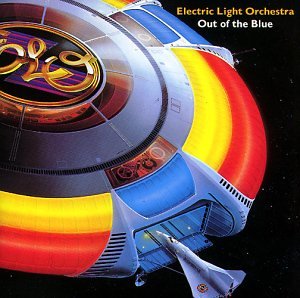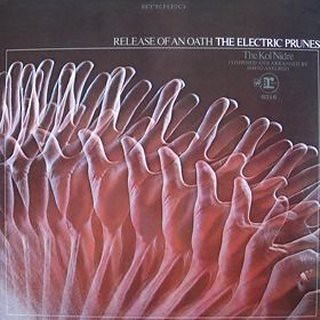
From the sublime to the sublimely ridiculous. ELO's fifth album, Face the Music (1975) has Jeff Lynne's late-Beatles rip-off style down pat, and even his vocals are recorded in that slightly echoey way that McCartney favoured, and there are the requisite minor chords, sevenths and key changes that are key to his facsimile approach. Also present is the string section which played such a fundamental part in the ELO sound. Face the Music is a slight anomoly though (the cover is out of style for a start, being rather tastelessly a photo of an electric chair), starting with a silly rock-out instrumental ('Fire On High'), but it's followed by a more stereotypical slowie, 'Waterfall', which is OK but a bit lifeless. The strings on Face the Music are surprisingly subdued throughout the album, but nothing can keep down 'Evil Woman' or 'Strange Magic' which are surely of the greatest (ie silliest) hits of the 1970's. There are a couple of other decent songs on the album ('Night Rider' is pretty rockin) but it's telling that those two singles really stand out.
For some reason I haven't got the superb New World Record, so we go straight on to 1977's absurd, bloated double album, Out of the Blue, which kicks off with the blistering pop-rock of 'Turn to Stone', a truly landmark piece of 70's pop - perfectly written, throwaway genius. Lynne's determination to create something monumental led directly to the mammoth Out of the Blue and while there's too much of it and some of it is really dreadfully stupid ('The Whale' anyone?), you can't deny that he had come up with an unbreakable formula for building pop songs from the ground up into towering slabs of hyper-processed brilliance. Nothing about Out of the Blue sounds quite real, it's almost as if it's been constructed by computers and samplers that didn't exist at the time, a little like real music has been rendered in plastic, and as far as pop music in the 1970's goes it simply doesn't get any better. In fact the opening trio of 'Turn to Stone', 'It's Over' and 'Sweet Talkin' Woman' is probably the greatest run of trash pop the seventies produced. Unfortunately Lynne had also worked out before anyone else the CD age virtue of front loading your album with the good stuff and assuming nobody is really listening by the time it ends, so there are three more sides to get through, a lot of which is forgettable or a bit second-rate, especially on the last side. The strings play a substantial role on Out of the Blue and either bolster or drown songs in specific cases. It's a strange and unwieldy album but the good songs are some of Lynne's best. Incidentally my brother had an amazing bubblegum pink vinyl copy of the 'Sweet Talkin' Woman' 7". It was incredible, I hope he's still got it.

In 1979, pretty much marking the end of ELO's general visibility, they released a Greatest Hits album, which covered Lynne's most successful songwriting period and contained tunes from all the 1974-1979 albums. Half of them are taken from Face the Music and Out of the Blue, but of those that aren't we've got such barnstormers as 'Livin' Thing', 'Can't Get It Out of My Head' and 'Telephone Line', all superb pop singles each of which demonstrates Lynne's phenomenal way with a hook and an absurdly melodic chorus. The only other thing we've got is a cheapo budget sampler, a "Definitive Collection" from 1999 which has all of the big hits already covered together with some later tunes, almost none of which are particularly worthy of attention (although 'The Diary of Horace Wimp' is a bit like a satire on 'A Day in the Life' which is pretty entertaining).


After their success with the prog classic 'I Had Too Much to Dream Last Night' the Electric Prunes went back to the studio with the mighty David Axelrod behind the mixing desk. In many ways this was a disastrous idea for the band because Axelrod had already got in mind what kind of record he wanted to make and whether it accorded with the Prunes didn't matter one jot. As the recording went on Axelrod basically removed all the members of the band from the studio and made his own record with a bunch of session musicians, so to call it an Electric Prunes album was already pretty disingenuous, but worse yet, the discord this created in the group led to them splitting up. In any event the record that "they" made, Mass in F Minor (1968) is really unsurprisingly another Axelrod album in all but name, mixing psych freak-out quitar workouts with classical chamber instrumentation. It's overblown, silly, and pretentious, but it's loads of fun, it's funky on occasion, it's dirty and scuzzy on others and although it's entirely instrumental, it does differ slightly from Axelrod's other work in that it does have a really rough rock edge to it. Similarly absurd is the follow-up, 1969's Release of An Oath, which is really more of the same (there are no members of the Electric Prunes playing on this Electric Prunes album...), but this time out there are some seriously tight grooves amongst the freak-out stuff and it's much closer in tone to Axelrod's Songs of Innocence. Having been primed to the idea of an Electric Prunes record with no vocals by Mass in F Minor, Release of An Oath really is pretty good. It does retain the entirely spurious religiosity (Axelrod claimed that these are song cycles based on ancient liturgical texts. I think that's a loads of balls and even if it isn't there's not much religious history in fuzz bass and wah-wah pedals) and insanely 60's mentality, but it's not bad by any means and it's a superb time capsule. The issue I've got has a bunch of alternate takes of the tunes on Release of An Oath, but they don't add greatly to the original album.


Next up are a couple of albums by Eleventh Dream Day. They were an odd band, moving between Neil Young by way of Bongwater indie rock albums and post-rock atmospherics. Third album Lived to Tell (1991) was the first on which everything came together and the countrified rock that constitutes the most part of the album is a great blend of Young's pushy sand-blasted rock and X's country rockabilly. There are some really good tunes on Lived to Tell and the vocal harmonies between Rick Rizzo and Janet Bean are where the X comparisons make sense the most, and demonstrate just what a great band Eleventh Dream Day were at that point. Better yet is the more straightforward rock of 1993's El Moodio. Rizzo's fuzzy, dynamic guitar work drives everything forward and there are few signs of bassist Doug McCombs' sideline in Tortoise, he's ably helping the heads-down rock along here. The songs on El Moodio are full of simple hooks and when they turn the amps and the pace down a bit and let the songs breathe, they really reveal themselves as not only a great band but excellent songwriters. The Young influence is still writ large throughout, but as we've discussed before, so what?


No comments:
Post a Comment